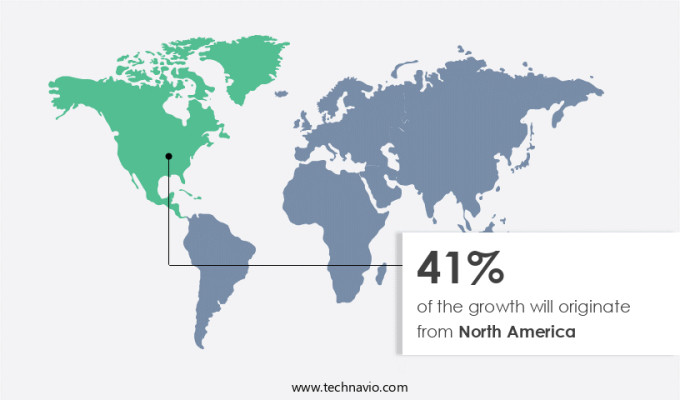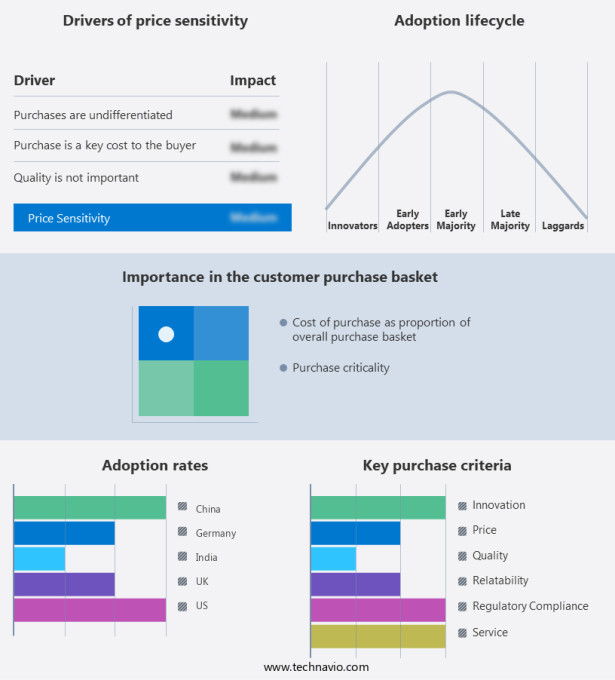Mobile Application Testing Solution Market Size and Trends
The mobile application testing solution market size is forecast to increase by USD 4.95 billion, at a CAGR of 11.1% between 2023 and 2028. The mobile application testing solution market is witnessing significant growth due to the increasing usage of mobile devices for various business and personal activities. With the expansion of m-commerce and the rise of IoT devices, the number of mobile applications is increasing, necessitating rigorous testing to ensure functionality, usability, and compliance with technical and business requirements. Android and iOS remain the dominant operating systems, necessitating testing across various screen resolutions and operating system versions. Additionally, network bandwidths and performance are crucial factors that require attention during testing. The market is also facing challenges from cyber threats, necessitating full security testing solutions. These trends and challenges highlight the importance of mobile application testing solutions in ensuring the success and security of mobile applications in the market.
Mobile applications have become an integral part of modern business strategies, with an increasing number of organizations relying on them to engage with customers and streamline operations. To ensure the success of mobile applications, it is crucial to address validation, functionality, and usability concerns. In this context, mobile application testing solutions play a pivotal role in addressing technical and business requirements. Functionality testing is essential to ensure that the mobile application performs as intended across various Android and iOS devices. This includes testing features, user interfaces, and integrations with other applications and services. Functionality testing covers both front-end and back-end aspects of the mobile application, ensuring that all components work together seamlessly. Usability testing is another critical aspect of mobile application testing. It focuses on evaluating the user experience (UX) and user interface (UI) design, ensuring that the application is intuitive and easy to use for potential customers. Usability testing involves assessing various elements, such as menus, dropdowns, and navigation buttons, to ensure they function optimally and meet user expectations. Technical requirements for mobile application testing include addressing screen resolutions, operating system versions, and network bandwidths. Ensuring compatibility with various screen sizes and resolutions is essential to deliver an optimal user experience. Testing against different operating system versions guarantees that the application functions correctly and consistently across various devices and platforms.
Additionally, assessing network bandwidths helps ensure that the application performs well in various connectivity scenarios. Performance testing is crucial to evaluate the mobile application's ability to handle heavy usage and provide a responsive user experience. This includes assessing the application's compatibility with mobile sensors such as gyroscopes, accelerometers, and GPS. Performance testing also covers critical bugs and potential bottlenecks, ensuring that the application runs smoothly and efficiently. Mobile application testing solutions are essential for organizations looking to optimize their mobile presence and enhance user experience. By addressing validation, functionality, usability, and performance concerns, organizations can ensure that their mobile applications meet user expectations and deliver value. Furthermore, testing mobile web applications is equally important, as more businesses adopt web-based mobile strategies. In summary, mobile application testing solutions help organizations validate, optimize, and enhance their mobile applications' functionality, usability, and performance. By addressing technical requirements, such as screen resolutions, operating system versions, network bandwidths, and mobile sensors, organizations can ensure a consistent and optimal user experience across various mobile devices and platforms.
Market Segmentation
The market forecast report provides comprehensive data (region-wise segment analysis), with forecasts and estimates in "USD million" for the period 2024-2028, as well as historical data from 2018 - 2022 for the following segments.
- End-user
- Commercial
- Individual
- Geography
- North America
- US
- APAC
- China
- India
- Europe
- Germany
- UK
- South America
- Middle East and Africa
- North America
By End-user Insights
The commercial segment is estimated to witness significant growth during the forecast period. The mobile application testing solution market caters to the validation needs of businesses and enterprises in the market, focusing on functionality and usability for Android and iOS platforms. Technical and business requirements dictate testing across various screen resolutions, operating system versions, and network bandwidths.
Get a glance at the market share of various segments Download the PDF Sample
The commercial segment accounted for USD 4.69 billion in 2018 and showed a gradual increase during the forecast period. Performance is a key concern, as mobile apps are increasingly utilized in sectors such as banking, finance, insurance (BFSI), retail, healthcare, and travel and tourism. Companies invest substantially in testing solutions to address bugs, enhance app performance, and adhere to industry standards. The growing importance of mobile applications in business processes and customer interaction necessitates the adoption of comprehensive testing solutions.
Regional Analysis
For more insights on the market share of various regions Download PDF Sample now!
North America is estimated to contribute 41% to the growth of the global market during the forecast period. Technavio's analysts have elaborately explained the regional trends and drivers that shape the market during the forecast period. In North America, the market for mobile application testing solutions is significant due to the expanding mobile subscriber base. The region accounted for over 30% of the global revenue generated from mobile games in 2023. The US dominates this market, given its high smartphone penetration rate. However, smartphone adoption has reached saturation as most residents own these devices.
Nonetheless, countries like the US and Canada are projected to attain substantial mobile and smartphone penetration rates during the forecast period. Mobile application testing solutions are essential in North America due to the widespread use of mobile devices and diverse mobile-OS combinations. These solutions optimize mobile applications for various smartphones and browsers, ensuring seamless user experiences for web apps, mobile web apps, and progressive web apps. Moreover, native apps are increasingly popular, necessitating rigorous testing to meet user expectations.
Our researchers analyzed the data with 2023 as the base year, along with the key drivers, trends, and challenges. A holistic analysis of drivers will help companies refine their marketing strategies to gain a competitive advantage.
Mobile Application Testing Solution Market Driver
The growing m-commerce industry is notably driving market growth. The market for mobile application testing solutions has gained significant traction due to the increasing prevalence of mobile apps on various devices and platforms. As mobile commerce continues to grow in the US, ensuring the quality and security of these applications becomes essential. Mobile apps offer consumers greater flexibility and convenience, enabling them to make purchases and access services from anywhere. Retailers are capitalizing on this trend by adopting mobile strategies, such as omnichannel marketing and mobile-first approaches. However, with the increasing number of mobile apps and devices comes an array of testing aspects and issues.
These include compatibility across multiple platforms and devices, adherence to quality standards, and addressing security vulnerabilities. Effective testing activities are crucial to identifying and resolving defects, ensuring a seamless user experience, and maintaining customer trust. Hybrid apps, which combine native and web technologies, present additional challenges for testing. Testing solutions must be able to address the unique complexities of these applications to ensure optimal performance and user experience. By investing in vital testing solutions, businesses can mitigate risks, enhance user satisfaction, and ultimately drive growth in the competitive mobile market.
Mobile Application Testing Solution Market Trends
Increasing number of mobile apps for IoT devices is the key trend in the market. The proliferation of Internet of Things (IoT) technology is driving the growth of mobile applications, as more devices become connected through software and sensors. The rising popularity of IoT devices, such as smartwatches and eyeglasses, is fueled by their convenience and mobility features. According to industry estimates, the number of annual smartphone shipments is projected to continue increasing, with smartphones anticipated to account for over 81% of all mobile phones in use worldwide by 2025. To ensure the functionality and compatibility of mobile applications with these IoT devices, various testing solutions have emerged. These include Automation Testing, Functional Testing, Regression Testing, Compatibility Testing, Beta Testing, Real Device Testing, Emulator Testing, and Simulator Testing.
Automation Testing automates repetitive tasks, saving time and resources. Functional Testing ensures the application functions as intended. Regression Testing identifies any new issues caused by updates or changes. Compatibility Testing ensures the application works seamlessly across various devices and operating systems. Beta Testing allows for user feedback before release. Real Device Testing uses actual devices for testing, while Emulator and Simulator Testing use virtual devices. In conclusion, the increasing adoption of IoT devices and the integration of mobile applications with these devices have led to the need for comprehensive mobile application testing solutions.
Mobile Application Testing Solution Market Challenge
The threat of cyber attacks is the major challenge that affects the growth of the market. In today's digital age, mobile applications have become an integral part of our daily lives, facilitating access to various personal and professional data. Native apps, web apps, and hybrid apps have diversified the mobile application landscape, catering to user expectations in a competitive industry. However, this proliferation of mobile applications also increases the risk of data breaches and privacy invasions. Outdated applications or those lacking the latest security patches leave users vulnerable to cyber-attacks.
Grayware poses a significant privacy risk by collecting and transmitting personal information without consent. Brands must prioritize mobile application testing solutions to safeguard their reputation and maintain user trust. Manual testing, exploratory testing, and ad hoc testing are essential testing methodologies to ensure application functionality, usability, and security. Testing in diverse environments is crucial to identify and address potential issues across various platforms and devices. By implementing rigorous mobile application testing, businesses can meet user expectations, mitigate risks, and stay ahead of industry competition.
Exclusive Customer Landscape
The market forecasting report includes the adoption lifecycle of the market, covering from the innovator's stage to the laggard's stage. It focuses on adoption rates in different regions based on penetration. Furthermore, the report also includes key purchase criteria and drivers of price sensitivity to help companies evaluate and develop their market growth analysis strategies.
Customer Landscape
Key Companies & Market Insights
Companies are implementing various strategies, such as strategic alliances, partnerships, mergers and acquisitions, geographical expansion, and product/service launches, to enhance their presence in the market.
- Broadcom Inc.: The company offers solution for mobile application testing that uses open source based technologies to enhance the system and extend its productivity, under the brand name of Broadcom.
The market research and growth report also includes detailed analyses of the competitive landscape of the market and information about key companies, including:
- Applause App Quality Inc.
- Capgemini Services SAS
- Digital.ai Software Inc.
- iBeta
- Infostretch Corp.
- International Business Machines Corp.
- Keysight Technologies Inc.
- Microsoft Corp.
- Norton Enterprises Inc
- Oracle Corp.
- Panasonic Holdings Corp.
- pCloudy
- QA InfoTech
- SAP SE
- Sauce Labs Inc.
- ScienceSoft USA Corp.
- Softcrylic LLC
- TestingXperts
- ZenQ
Qualitative and quantitative analysis of companies has been conducted to help clients understand the wider business environment as well as the strengths and weaknesses of key market players. Data is qualitatively analyzed to categorize companies as pure play, category-focused, industry-focused, and diversified; it is quantitatively analyzed to categorize companies as dominant, leading, strong, tentative, and weak.
Market Analyst Overview
Mobile application testing is a crucial aspect of software development, ensuring the functionality, usability, and compatibility of applications on various mobile devices and operating systems. Validation of business and technical requirements is essential on Android and iOS platforms, considering screen resolutions, operating system versions, network bandwidths, and performance. Mobile sensors, such as gyroscopes, accelerometers, and GPS, require specific testing. Menus, dropdowns, and navigation buttons need to function seamlessly. Critical bugs impact user experience, leading to potential customer dissatisfaction and brand reputation damage. Testing aspects include usability, uninstallation, and compatibility with diverse mobile devices, platforms, and mobile-OS combinations. Web app testing for web applications, browsers, mobile web apps, and progressive web apps is essential. Native apps, hybrid apps, and mobile apps require optimization for smartphone usage and various programming languages.
Further, quality standards prioritize security, addressing issues related to user experience, software development, testing activities, and defects. Industry competition necessitates addressing user expectations and ensuring compatibility across multiple native apps, web apps, and hybrid apps. Manual testing, exploratory testing, ad hoc testing, usability testing, automation testing, functional testing, regression testing, compatibility testing, beta testing, real device testing, emulator testing, and simulator testing are essential testing methods. Mobile web browsers also require testing for optimal performance.
|
Market Scope |
|
|
Report Coverage |
Details |
|
Page number |
141 |
|
Base year |
2023 |
|
Historic period |
2018 - 2022 |
|
Forecast period |
2024-2028 |
|
Growth momentum & CAGR |
Accelerate at a CAGR of 11.1% |
|
Market growth 2024-2028 |
USD 4.95 billion |
|
Market structure |
Fragmented |
|
YoY growth 2023-2024(%) |
10.0 |
|
Regional analysis |
North America, APAC, Europe, South America, and Middle East and Africa |
|
Performing market contribution |
North America at 41% |
|
Key countries |
US, China, UK, India, and Germany |
|
Competitive landscape |
Leading Companies, Market Positioning of Companies, Competitive Strategies, and Industry Risks |
|
Key companies profiled |
Applause App Quality Inc., Broadcom Inc., Capgemini Services SAS, Digital.ai Software Inc., iBeta, Infostretch Corp., International Business Machines Corp., Keysight Technologies Inc., Microsoft Corp., Norton Enterprises Inc, Oracle Corp., Panasonic Holdings Corp., pCloudy, QA InfoTech, SAP SE, Sauce Labs Inc., ScienceSoft USA Corp., Softcrylic LLC, TestingXperts, and ZenQ |
|
Market dynamics |
Parent market analysis, Market growth inducers and obstacles, Fast-growing and slow-growing segment analysis, COVID-19 impact and recovery analysis and future consumer dynamics, Market condition analysis for forecast period |
|
Customization purview |
If our report has not included the data that you are looking for, you can reach out to our analysts and get segments customized. |
What are the Key Data Covered in this Market Report?
- CAGR of the market during the forecast period
- Detailed information on factors that will drive the market growth and forecasting between 2024 and 2028
- Precise estimation of the size of the market and its contribution of the market in focus to the parent market
- Accurate predictions about upcoming market growth and trends and changes in consumer behaviour
- Growth of the market across North America, APAC, Europe, South America, and Middle East and Africa
- Thorough analysis of the market's competitive landscape and detailed information about companies
- Comprehensive analysis of factors that will challenge the growth of market companies
We can help! Our analysts can customize this market research report to meet your requirements. Get in touch




